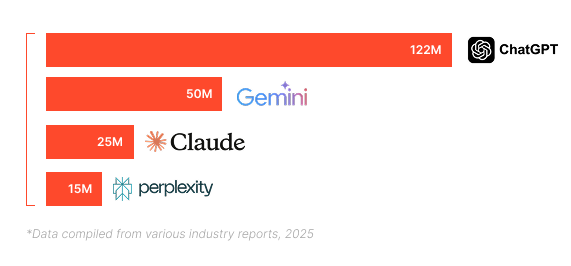In this post, you’re going to learn how to rank on ChatGPT, so when you search something like “What are the best Toronto web agencies?”, your website shows up.
Google is great for traditional SEO, but AI searches are taking over.. quite literally. ChatGPT is becoming a part of everyday life. In fact, around 122 million people use ChatGPT every day.
But it’s not just ChatGPT – AI search is exploding across all platforms:

More people are using voice search in ChatGPT because it removes all the nonsense that google sometimes shows (the ads you whizz by and the extra fluff that google throws in)
But why does this matter?
Because it’s created a new dynamic for SEO: you can now take specific steps to optimize your website so it appears directly in AI-generated answers.
Awesome, right?
Well, the issue is that ChatGPT doesn’t work like Google. It doesn’t crawl your site or index new pages in real time. Instead, it pulls from trusted sources and content it’s already been trained on. That means you need to take actionable steps now if you want your business to start showing up.
How ChatGPT actually works (and why it matters)
Here’s what most people don’t know: ChatGPT has two different ways of finding information.
The Old Way
ChatGPT was trained on tons of web content up to a certain date. If your content was part of that training data, great!
The New Way (SearchGPT)
With SearchGPT (launched in July 2024), OpenAI now searches the web in real-time. This is huge because it means fresh content can actually show up in results.
But here’s the catch – SearchGPT works differently than Google.
When you ask a question, it searches the web in real-time. Instead of just matching keywords, it reads and interprets content to find the best answer. Then it pulls relevant information from multiple sources and presents it as a conversational response with citations.

The Local Search Problem (This Is Important)
Here’s something most people miss: ChatGPT doesn’t understand location the same way Google does.
When someone in New York searches “best pizza restaurant,” Google knows they want NYC pizza places. But ChatGPT? It might give you results from anywhere.
This creates a massive opportunity for local businesses.
We’ve found out that ChatGPT struggles with:
- Real-time local business hours
- Current location-based results
- Local inventory and availability
- Regional preferences and slang
But, It’s Great At:
- General local recommendations
- City-specific guides and advice
- Local service explanations
- Regional industry information
So how does ChatGPT rank websites?
ChatGPT wouldn’t actually give me a proper answer as to what makes it rank websites, but I asked around 50 random questions to try and derive a pattern from the outputs it was giving me. Here’s what I found:
You need to be a trusted source
ChatGPT recommends websites that look credible. This means:
- Author names and credentials
- Recent publish dates
- Proper citations and sources
- Reviews on 3rd party websites (Trust pilot, BBB, Clutch, etc.)
Your content should answer questions directly
People ask ChatGPT questions as though they’re talking to a friend, as opposed to Google, where they may ask a more formal question. Your content should match this. Instead of writing “SEO Services Toronto,” write “What are the best SEO services in Toronto?”
Tip: Use tools like Answer The Public to find the exact questions people are currently asking in your industry.
Inform. Inform. Inform.
ChatGPT prefers content that covers topics completely. A 500-word blog post about “digital marketing” won’t cut it. But a 3,000-word guide covering strategy, tactics, tools, and case studies? That’s what gets cited. The more relevant information you include, the better your chances are at ChatGPT citing it.
Fresh Content Gets Priority
Unlike Google, where old content can rank for years, ChatGPT seems to prefer newer content. We’ve seen 2024 articles outrank established pages from 2020. Was your blog post last updated in 2019? Is the information still relevant? If not, update it.
Improve Your Authority
This goes hand in hand with traditional SEO. Improve your domain rating, generate guest posts on notable sites, increase your social following.
Brand Mentions
Work on your public relations. The more mentions your brand has from reputable sources, the more likely it is for ChatGPT to note that as a credible source and recommend your product or service in its responses.
Here’s what you should be doing to optimize your site for SEO in LLMs
Audit Your Current Content
Look at your existing content and ask:
- Does it answer specific questions?
- Is it comprehensive?
- Is it recent (2024-2025)?
- Does it have clear authorship?
Research Question-Based Keywords
Instead of targeting “plumber Toronto,” target:
- “How do I find a good plumber in Toronto?”
- “What should I look for in a Toronto plumber?”
- “How much does a plumber cost in Toronto?”
Create Comprehensive Resource Pages
Build detailed guides that cover everything about your topic:
- Guides
- FAQ sections
- Step-by-step tutorials
- Industry reports
Optimize for Conversations
Write like you’re talking to someone:
- Use simple language
- Answer follow-up questions
- Include examples
- Be conversational but professional
Build Authority
- Get mentioned in industry publications
- Build high-quality backlinks
- Create original research
- Establish thought leadership in your industry
